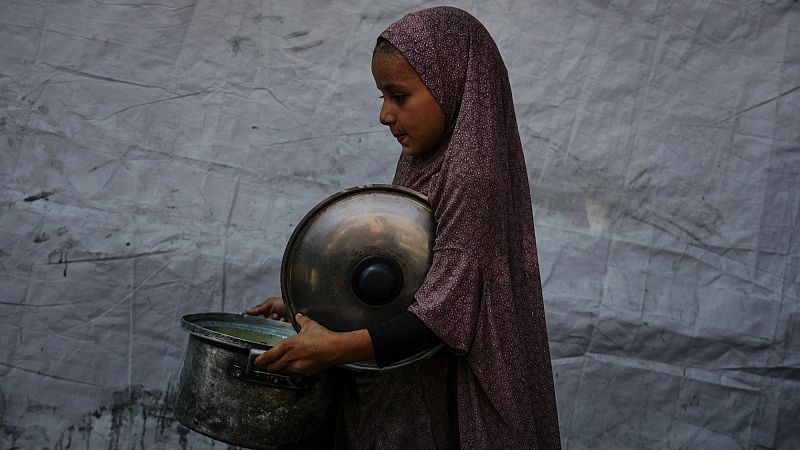Aid group warns more than 54,000 children in Gaza face life-threatening malnutrition

Tens of thousands of children in Gaza are acutely malnourished, according to new estimates from the United Nations agency for Palestinian refugees.
Between January 2024 and August 2025, child malnutrition – a life-threatening condition that requires medical treatment – rose during periods when Israel imposed severe restrictions on humanitarian aid in the Gaza Strip, the study found.
As of mid-August, researchers estimated that 54,600 children were acutely malnourished, including more than 12,800 with severe malnutrition, which puts their health and long-term development at risk.
Malnutrition goes far beyond hunger. It affects the body’s basic functioning, making it harder to move, think, and fight off infections, meaning it can be fatal. Treatment involves taking special nutritional supplements over several weeks.
The study was published in The Lancet, a top medical journal, and funded by the UN Relief and Works Agency for Palestine Refugees in the Near East (UNRWA).
The agency has long been at odds with Israeli authorities, who claim it has been infiltrated by Hamas, including participants in the 7 October 2023 attacks that left more than 1,200 Israelis dead. More than 67,000 people in the Gaza Strip have been killed in Israel’s retaliatory offence, according to the Gaza health ministry, which does not distinguish between civilians and combatants.
Meanwhile, the European Union says UNRWA provides “crucial services in education, health, and social protection” for Palestinians in the region.
The findings come as Gaza City faces famine – an official determination made in August – and amid fresh ceasefire talks this week between Israel and Hamas.
Without an end to the war, “a further deterioration in early childhood nutrition with increased mortality are inevitable in the Gaza Strip,” said Dr Akihiro Seita, UNRWA health director and senior author of the study.
Between January 2024 and mid-August 2025, UNRWA staff screened nearly 220,000 children under the age of five for malnutrition, which is defined as a child being too thin for their height and signals rapid weight loss and a lack of energy, protein, and nutrients.
The researchers used these screenings to estimate how widespread acute malnutrition is among all 346,000 children under five in the Gaza Strip.
They found that child malnutrition rose from 4.7 per cent in January 2024 to 14.3 per cent a year later. It fell to 5.5 per cent in March, coinciding with the end of a six-week ceasefire.
However, an 11-week Israeli blockade – in place from March to May – further squeezed Gazans’ access to food, medicines, and other supplies, according to the UN. Israel denied imposing restrictions on aid, saying its rules aimed to ensure supplies reached the people and not Hamas.
By mid-August, 15.8 per cent of Gaza’s children under five years old were malnourished, with 3.7 per cent severely malnourished, the study found. In Gaza City, 28.8 per cent of young children were malnourished.
Severely malnourished children have little chance of recovery, UNRWA warned, because there is too little food assistance available and the health system has been decimated.
About 400 people in Gaza have died from malnutrition and related causes since January, including 101 children, according to the UN. More than 10,000 children have been diagnosed with acute malnutrition in the past two months, with about 2,400 at risk of starvation.
Dr Masako Horino, a nutrition epidemiologist at UNRWA and the study’s lead scientist, said Gaza’s children are facing life-threatening risks from malnutrition.
“Following two years of war and severe restrictions in humanitarian aid, tens of thousands of pre-school-aged children in the Gaza Strip are now suffering from preventable acute malnutrition and face an increased risk of mortality,” Horino said.
Today

